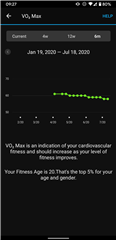
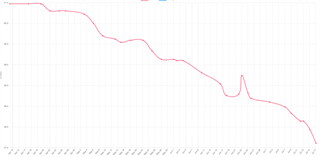
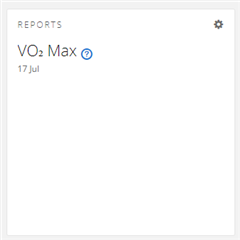
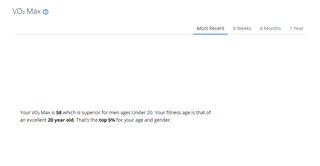
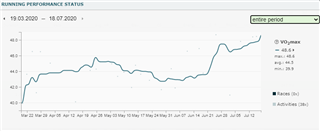





Your initial measurement was obviously wildly overestimated, and it's gradually correcting itself with more data.
Are you looking at the corrected Vo2 values on Runalyze?
For aerobic improvements…
A max of 199 to 203 would be accurate. I'd aim closer to the 203 at your age.
220-age = 203 -> generally accepted max without correcting for age
Or
211-(0.65×age) = 199 -> more accurate after…
Do a half marathon time trial. You should finish 21.2km in 90 minutes at a Vo2 of 51. A pace of 4:15 /km. This is a time and pace you should be able to accomplish today if your Vo2 is 51. So go for it.
But, it must be obvious that you dont have a Vo2 in the 50's. It could get there with training, and a low to mid 40s Vo2 is a fantastic starting place. You're all ready in a good situation.
Check out this post from an individual just a couple years older than you and what it took to get the sub 20 5km. www.reddit.com/.../
I don't think you can directly link Vo2 and race times but if you're right, yeah, I won't be able to run a half marathon in 90 minutes (at least not right now). I think it would be something like 1 hour and 45 minutes or so.
So everyone who has a Vo2 of 51 can just go out and run a half marathon in 90 minutes if you're right? I don't think that will be the case...
Also thank you for that Reddit post, it was an interesting read.
EDIT: but if my Vo2 would be in the low / mid 40s, it will take almost a year for my Garmin to finally reach that value. Also yesterday after my 10K run, my Garmin estimated my Vo2 max higher than it was before so it estimated a value higher than 57 which either means it (again) went completely nuts at calculating my Vo2 max or it's almost at the value it should be? Look at this graph (Vo2 data is extracted from the .fit files):
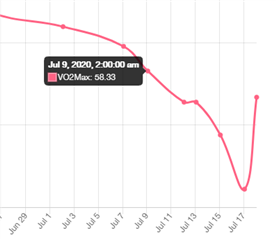
The garmin calculated VO2 is based on several factors, but a workout with a high aerobic load would explain the increase.
Its not the everyone at a 51 Vo2bcan complete a marathon at that pace. That's why I gave you the predicted times and pace for 5km, 10km, and 21.1km. But they would be close enough at one of those distances.
Race predictions and Vo2 max estimations are based on a sample population. There will be individuals that never achieve those times despite a superior Vo2 due to genetics, injury, training status... and there will be others with lower Vo2 that can achieve those targets again due to genetics training status
Bottom line. You've made great progress to date. Be proud of it. Dont worry about the predictions or estimated data. With more data, those get better, but never perfect. Do you have a time/pace goal for your 1/2?
Is your training aligned well with the target? Your doing long runs, and goal pace workouts, with some easy runs on top for volume.
I would ensure my age, bodyweight, hr, and if you can LTHR are kept as accurate as feasible to improve the accuracy of the estimates.
Testing LTHR once a quarter should be sufficient for those zones, unless you make a bug jump I'm progress - and they would need to be retested.
Thank you for your detailed answer!
I'm aiming to run my half marathon in 1 hour 45 minutes or maybe a few minutes faster (around 4:59-4:55min/km).
My training consists of running 4 times a week. 2 easy sessions, 1 speed work / goals pace run, and 1 long run with 2 days of cross-training.
All my details are entered correctly in Garmin Connect (except my max heart rate which I don't know). I know my max heart rate plays a big role in calculating my Vo2 max but I think a max heart rate of 200 would be accurate.
I also have the feeling the Vo2 max estimates for young people aren't that great with the Garmin watches. I'm actually 16 years old (17 in a few days) so maybe their (Firstbeat's) algorithm doesn't work that well with young people.
A max of 199 to 203 would be accurate. I'd aim closer to the 203 at your age.
220-age = 203 -> generally accepted max without correcting for age
Or
211-(0.65×age) = 199 -> more accurate after 35 years
Your 245 can also auto set Max hr based on your performance in training sessions. I'd want a HR strap to measure, and adjust.
Set your watch to the current predicted Max (203), and also set the auto adjust so if you have a workout above 203bpm, it will move your target up (accordingly).
The workouts sound like they should be on point. Total volume will dictate success for your target pace/goal. Get you're weekly above 50km on the low end, to around 80km on the higher end. Quality work is important, so dont chase extra mileage if technique is breaking down (good sometimes, but infrequently to ensure progress).

Hemos hecho una selección de <a href="">www.todo-deporte.com/.../guantes-boxeo">Guantes de Boxeo</a> para que puedes ganar anillos de oro y hemos elegido los mejores guantes de Boxeo calidad precio del mercado, los materiales que tienen nuestros guantes de boxeo son de una calidad duradera. Tenemos guantes de boxeo con cordones para clientes que lo necesiten
I suspect the maximum heart rate affects the VO2 max estimate a lot. This is because it's not how fast you run that matters, but how much below your maximum effort you are while doing it. I have noticed doing an interval session with pace a bit off best but heart rate unusually low, and my VO2 max goes up because the latter was a larger effect on the calculation.
The problem is that maximum heart rate estimates are not that great, and there is also a lot of variability in how near to that heart rate you can manage for a given time. These matter to VO2 max, as it is empirically similar to maximum effort for 5-8 minutes.